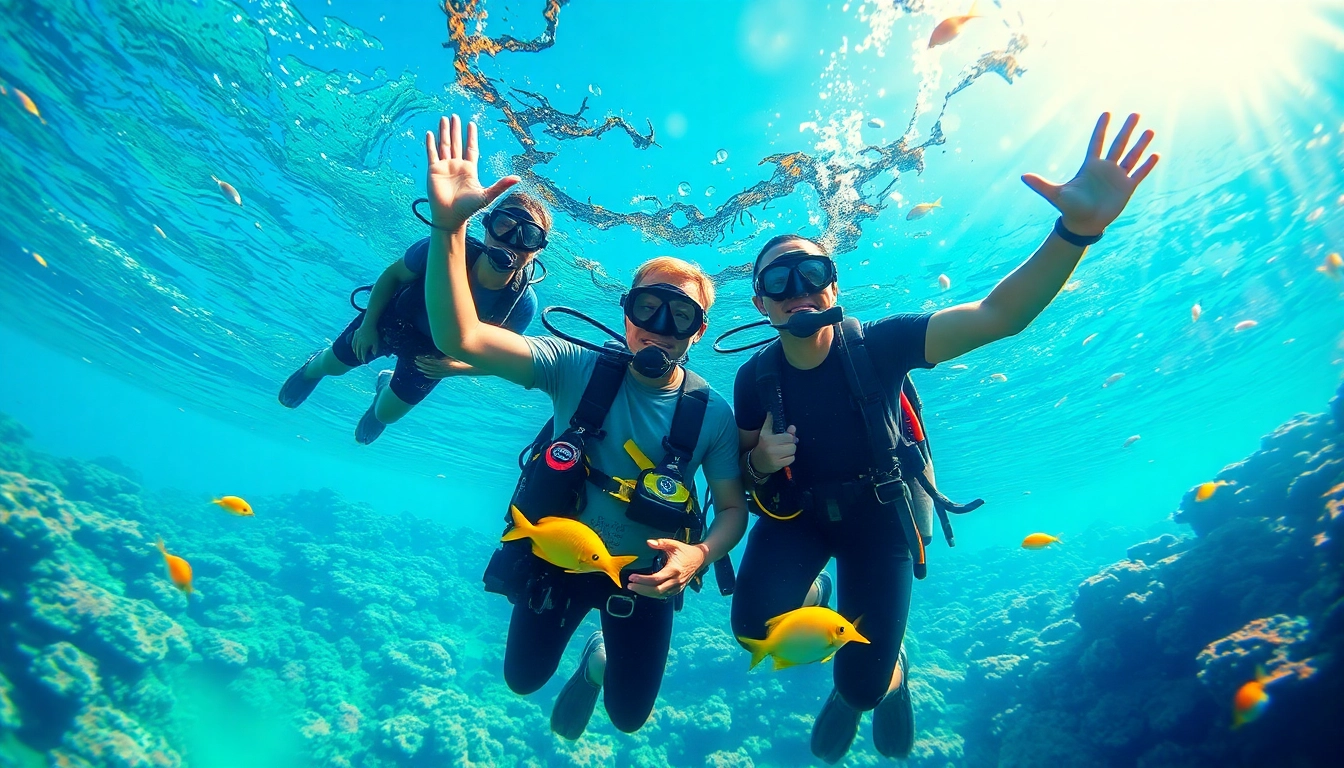Understanding the Bali Diving Course
What is a Bali diving course?
A Bali diving course provides prospective divers with the training, skills, and certifications needed to explore the stunning underwater ecosystems surrounding the island of Bali. These courses range from introductory sessions for beginners to advanced training for experienced divers looking to enhance their skills. Instruction typically includes both theoretical knowledge, such as understanding diving physics, safety protocols, and marine environments, as well as practical skills learned in controlled pools and open water settings. Notably, some courses offer certifications recognized globally, allowing divers access to dive sites around the world.
Why choose Bali for diving?
Bali is renowned for its vibrant marine life, beautiful coral reefs, and unique dive sites—making it a premier destination for divers of all levels. The island offers diverse dive environments, from tranquil beach dives suitable for beginners to challenging drift dives for the more experienced. The rich biodiversity of the coral reefs supports a myriad of marine species, including colorful fish, turtles, and even manta rays. Moreover, the warm waters and year-round diving conditions add to the allure of Bali as a diving hotspot. Participating in a Bali diving course not only promises an enriching experience but also the opportunity to immerse oneself in the enchanting culture and scenery of this Indonesian paradise.
Overview of course levels
Bali diving courses cater to a wide range of skill levels:
- Discover Scuba Diving: This introductory course is designed for those wanting to experience diving for the first time, covering basic safety protocols and skills in a controlled environment.
- PADI Open Water Diver: This internationally recognized certification allows divers to explore the underwater world independently. It includes theory lessons, supervised training sessions, and open water dives.
- Advanced Open Water Diver: This course enhances diving skills through specialties like wreck diving, night diving, and deep diving.
- Rescue Diver Course: A critical course focused on emergency response and rescue techniques, essential for developing skills needed to assist other divers.
- Specialty Courses: Various advanced courses are available, including Nitrox, underwater photography, and marine ecology.
Prerequisites and Requirements for Enrollment
Age and health considerations
Most Bali diving courses require participants to be at least 10 or 12 years old, depending on the course level. Health is paramount in diving; thus, candidates are typically asked to fill out a health questionnaire. Those with pre-existing medical conditions, such as respiratory or cardiac issues, should consult a doctor before beginning any diving course. In some cases, a medical clearance may be required to ensure safety while diving.
Necessary documentation
To enroll in a Bali diving course, participants must present identification and, in some instances, a medical statement confirming their fitness to dive. If enrolling in a certification course, previous diving certifications need to be provided, if applicable, along with any required payments and forms associated with the diving school.
Equipment needed for Bali diving courses
Diving equipment is essential for safety and comfort while underwater. Students in Bali diving courses can often rent or purchase essential gear. Usually, required equipment includes:
- Dive mask and snorkel
- Fins
- Wetsuit or dry suit
- Buoyancy control device (BCD)
- Regulator and tank
Most diving schools will provide the necessary equipment for training sessions, while students are encouraged to invest in personal gear for comfort and hygiene.
Find the Right Bali Diving Course for You
Beginner courses for first-time divers
For those new to diving, beginner courses provide an excellent introduction to the underwater realm. The Discover Scuba Diving program is ideal for those who want to experience diving without committing to a full certification. It typically includes a brief theory lesson followed by supervised dives with an instructor.
The PADI Open Water Diver course is a more comprehensive option for beginners wishing to gain a globally recognized certification. This course includes classroom instruction, confined water training, and four open water dives.
Advanced and specialty courses available
For divers looking to enhance their skills, advanced courses offer deeper insights into diving techniques and environmental awareness. The Advanced Open Water Diver course allows divers to explore underwater navigation and other specializations, such as wreck diving or night diving. Specialty courses focus on specific areas like underwater photography, naturalist studies, or deep diving techniques.
Comparing courses offered by different schools
To find the course that best suits your needs, it’s essential to compare offerings from different diving schools in Bali. Look for factors such as:
- Course structure: Ensure the course includes both theoretical and practical training opportunities.
- Instructor qualifications: Research the backgrounds and experience of instructors to ensure a high standard of training.
- Guest reviews: Check reviews from past students to gauge the quality of instruction and overall experience.
- School reputation: Select accredited diving schools with a good reputation in the diving community.
Tips for an Enriching Diving Experience
Preparing for your Bali diving course
Preparation is key to enjoying your diving experience in Bali. Here are some tips to consider:
- Research: Familiarize yourself with the local marine environment and dive sites to enhance your understanding and appreciation of your dives.
- Physical fitness: Make sure to maintain an adequate level of fitness prior to your course, as diving can be physically demanding.
- Hydration: Stay hydrated before and after dives to ensure optimal health and performance.
Best practices while diving
While diving, it’s crucial to adhere to safety protocols and best practices. Always dive with a buddy to enhance safety and share the experience. Pay attention to dive briefings provided by instructors and monitor your air supply. Respect underwater wildlife and refrain from touching or disturbing marine life, ensuring a sustainable and safe diving practice.
Post-dive care and safety protocols
After completing a dive, divers should take care to monitor their bodies for any signs of decompression sickness. Staying well-hydrated, resting, and adhering to surface intervals between dives is crucial. If experiencing any symptoms or doubt, seek professional medical advice immediately. Additionally, enjoy your post-dive experience, whether through sharing stories with fellow divers or taking part in local cultural activities.
Continuing Your Diving Education in Bali
Advanced certifications available
Once you’ve completed initial courses, there are plenty of opportunities to advance your diving education in Bali. Consider pursuing certifications that will allow deeper exploration into specific areas such as cave diving or technical diving. These certifications enhance your skill set and broaden your diving capabilities.
Opportunities for internships and professional training
Bali serves as a hub for diving internships and instructor training programs. Many dive schools offer programs for certified divers to gain teaching experience. Such internships provide hands-on experience assisting instructors, conducting dive briefings, and guiding dives—all of which can significantly enhance your skills and understanding of the sport.
Joining a local diving community
Engaging with the local diving community in Bali can enhance your diving experience significantly. Many dive schools host events, social gatherings, and community clean-up efforts. Joining local diving clubs or online communities can connect you with fellow divers, from beginners to locals with extensive experience. These connections not only open doors for dive buddy opportunities but also allow you to share tips and recommendations for dive sites and courses.



